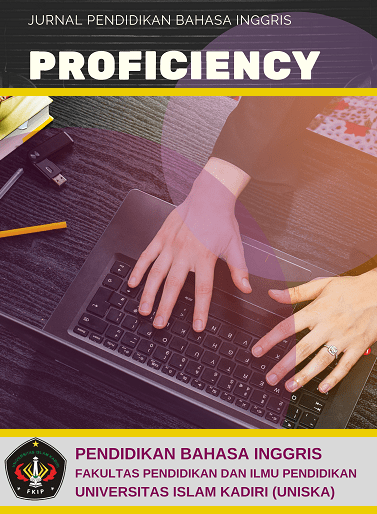THE EFFECT OF DUOLINGO IMPLEMENTATION ON SEVENTH-GRADE STUDENTS’ VOCABULARY MASTERY
Abstract
Mastering vocabulary is important in order to elevate English skills in every aspect (Reading, Listening, Speaking, Writing). In learning a language, a strong fundamental of vocabulary knowledge is needed. However, it seems difficult to learn English if students do not master the vocabulary. Based on preliminary observations by researchers at Public Junior High School in North Bali, researcher found that most students' vocabulary skills did not meet the standards set by the school curriculum. The purpose of this study is to determine the impact of Duolingo on the vocabulary skills of 7th-grade students in Public Junior High School In North Bali. The researcher wants to know and investigate whether the use of Duolingo has a significant effect on the vocabulary skills of 7th-grade students by comparing two different groups. One group got treatment by implementing Duolingo in the learning process, while the other group did not receive treatment. This study used an explanatory sequential mixed method design using The post-test of quasi-experimental design. The results of this study showed that the average score in the experimental class from the post-test value is higher than the control group. From the paired t-test result, it is shown that sig.2 tailed of 0.000 <0.05 which indicates that using Duolingo does affect students’ vocabulary mastery
References
Ajisoko, P. (2020). The use of duolingo apps to improve English vocabulary learning. International Journal of Emerging Technologies in Learning, 15(7), 149–155. https://doi.org/10.3991/IJET.V15I07.13229
Astarilla, L. (2018). University students’ perception towards the use of Duolingo application in learning English. CelSciTech-UMRI, 3, 1–9. http://ejurnal.umri.ac.id/index.php/PCST/article/download/985/562
Astarilla Liya. (2020). The effect of Duolingo on english as foreign language university students’ vocabulary mastery. ICoSEEH 2019, 209–215. https://doi.org/10.5220/0009104502090215
Aulia, H. R., Wahjuningsih, E., & Andayani, R. (2020). Effect of Duolingo application on students’ English vocabulary mastery. ELTR Journal, 4(2), 131–139. https://doi.org/10.37147/eltr.v4i2.71
Bustillo, J., Rivera, C., Guzmán, J. G., & Ramos Acosta, L. (2017). Benefits of using a mobile application in learning a foreign language. Sistemas y Telemática, 15(40), 55–68. https://doi.org/10.18046/syt.v15i40.2391
Carter, N., Bryant-Lukosius, D., Dicenso, A., Blythe, J., & Neville, A. J. (2014). The use of triangulation in qualitative research. Oncology Nursing Forum, 41(5), 545–547. https://doi.org/10.1188/14.ONF.545-547
Creswell, J. W., & Poth, C. N. (2007). Qualitative inquiry and research design choosing among five approach (L. Shaw Cuevas (ed.); 2nd ed.). Sage Publications.
Hidayanti, T., & Diana, S. (2019). Students’ motivation to learn english using mobile application : the case of Duolingo and hello english. JEELS (Journal of English Education and Linguistics Studies), 6(2), 189–213. http://journal.um-surabaya.ac.id/index.php/JKM/article/view/2203
Karjo, C. H., & Andreani, W. (2018). Learning foreign languages with Duolingo and Memrise. ACM International Conference Proceeding Series, 45, 109–112. https://doi.org/10.1145/3231848.3231871
Kusumadewi, H., & Widyastuti, M. (2018). The effects of using Duolingo towards students’ vocabulary mastery. IJET, 7(2), 172–186.
Loewen, S., Crowther, D., Isbell, D. R., Kim, K. M., Maloney, J., Miller, Z. F., & Rawal, H. (2019). Mobile-assisted language learning: a Duolingo case study. ReCALL, 31(3), 293–311. https://doi.org/10.1017/S0958344019000065
Nguyen, T. T. H., & Nga Thu, K. T. (2013). the effectiveness of learning vocabulary through games. ASIAN EFL JOURNAL.
Pallant, J. (2016). SPSS Survival Manual, 6th edition, 2016 (6th ed.). Open University Press.
Putri, L. M., & Aulia Islamiati. (2018). Teaching listening using Duolingo application. PROJECT (Professional Journal of English Education), 1(4), 460–465. https://doi.org/10.22460/project.v1i4.p486-491
Şendurur, E., Efendioǧlu, E., Çalişkan, N. Y., Boldbaatar, N., Kandin, E., & Namazli, S. (2017). The M-learning experience of language learners in informal settings. Proceedings of the 13th International Conference on Mobile Learning 2017, ML 2017, 2014, 119–123.
































